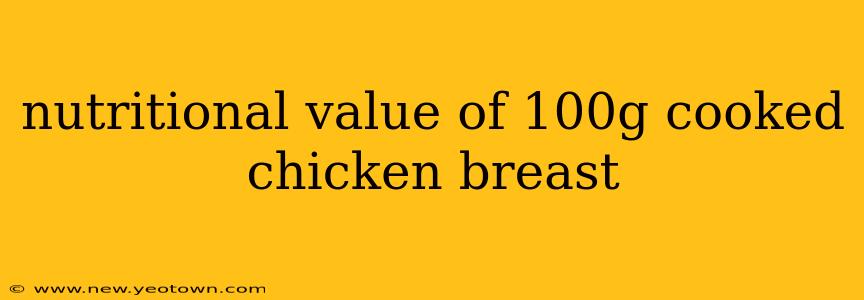The Nutritional Powerhouse: Unveiling the Value of 100g Cooked Chicken Breast
Chicken breast. It's a staple in kitchens worldwide, lauded for its lean protein and versatility. But just how nutritious is a 100g serving of this culinary workhorse? Let's delve into the details, exploring not just the basics but also answering some frequently asked questions surrounding this popular protein source.
Imagine this: you're preparing a healthy dinner, and chicken breast is the star. You carefully measure out 100g of cooked chicken. What are you actually getting? More than just a protein boost, that's for sure! A 100g serving of cooked chicken breast is a nutritional powerhouse, offering a surprisingly diverse array of essential nutrients vital for maintaining a healthy body.
The Nutritional Breakdown of 100g Cooked Chicken Breast
While exact values can slightly vary based on factors like the chicken's breed and cooking method, a typical 100g serving of cooked chicken breast boasts approximately:
-
Protein: Around 30g - This is the star of the show! Protein is crucial for building and repairing tissues, making chicken breast an excellent choice for muscle growth and overall bodily function.
-
Calories: Around 165 calories - Relatively low in calories, making it a suitable choice for those watching their weight.
-
Fat: Around 3-5g - Mostly unsaturated fats, which are beneficial for heart health. The low-fat content further enhances its appeal for health-conscious individuals.
-
Vitamins and Minerals: Chicken breast offers a modest amount of various essential vitamins and minerals, including niacin, selenium, and vitamin B6. These micronutrients contribute to various metabolic processes and overall well-being.
Is Chicken Breast Good for Weight Loss?
Yes, chicken breast is often considered a weight-loss friendly food. Its high protein content promotes satiety (feeling full), which can help curb cravings and prevent overeating. Furthermore, its relatively low calorie and fat content makes it easier to manage your daily caloric intake while still meeting your protein requirements.
What are the Benefits of Eating Chicken Breast?
The benefits extend beyond weight management. The high protein content is crucial for:
- Muscle Growth and Repair: Essential for athletes and those focused on strength training.
- Maintaining Healthy Bones: Protein supports bone health and density.
- Boosting Metabolism: Protein helps increase your metabolic rate, aiding in calorie burning.
- Supporting Immune Function: Certain nutrients found in chicken support a healthy immune system.
How Does the Nutritional Value Change with Different Cooking Methods?
The cooking method can subtly affect the nutritional profile. While boiling or steaming retains more nutrients, grilling or baking can add a slight increase in calories due to added fats from oils or the natural fat rendered during cooking. However, the overall nutritional value remains largely consistent across common cooking methods.
Is Chicken Breast a Complete Protein?
Yes, chicken breast is a complete protein, meaning it contains all nine essential amino acids that your body cannot produce on its own. This makes it a high-quality protein source, vital for optimal health and bodily functions.
Can I Eat Chicken Breast Every Day?
While chicken breast is a highly nutritious food, it's generally recommended to vary your protein sources. A balanced diet incorporating various protein sources, along with fruits, vegetables, and whole grains, offers the broadest range of nutrients and helps prevent nutritional deficiencies.
In conclusion, a 100g serving of cooked chicken breast offers a significant amount of high-quality protein, along with essential vitamins and minerals, within a relatively low-calorie and low-fat profile. While it's a fantastic addition to a healthy diet, remember that a balanced approach with diverse foods is key to optimal well-being.

